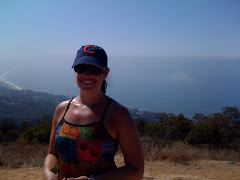 After a great trip to the Namibian sand dunes, I met up with an overland tour through Botswana.
After a great trip to the Namibian sand dunes, I met up with an overland tour through Botswana.“Beautiful Botswana,” as the bushman song that sticks in your head for days indicates, is a country known for its beauty and animals.
Unfortunately for us, we arrived during peak water flow in the Okavango Delta, so didn’t actually get to see a whole lot of animals.
However, I'm not too disappointed since every day can't be perfection and there were still some bright spots in between the hours and hours of driving, including:
Game tasting- enjoyed a selection of ostrich, zebra, kudu, crocodile and springbok before I left Windhoek. Zebra is very tasty, despite what the cheetahs at Na/ ‘an ku se
thought.
 Bushman walk- a local bushman tribe showed us the different plants they use to cure various ailments, then topped it off with a demonstration on fire making that made us all want to hand over a lighter (not quick!).
Bushman walk- a local bushman tribe showed us the different plants they use to cure various ailments, then topped it off with a demonstration on fire making that made us all want to hand over a lighter (not quick!).Okavango Delta- okay, so there weren’t too many highlights here, but we still had a few good laughs. After a 2 ½ trip in a leaking mokoro (dug out wooden canoe pushed by a long pole) that reminded me of the bible story of baby Moses going through the reeds, we arrived at a patch of land and pitched our camp—picture swampland and lots of mosquitoes!
In the afternoon we embarked on a game walk where we were briefed to run and climb a tree if we got close to a buffalo, run downwind around an elephant and stand still in the presence of a lion; sure, it had us on edge but that was before we knew there were NO animals anywhere nearby, just lots of dung giving us false hope. We did spot a group of zebra and wildebeest which was cool the first time when we scared them away- the noise of a 100 zebras running in the middle of nowhere is shockingly loud (over time it became clear it isn't so tough to find a zebra in Africa!)
The next morning it was a 5am rise for a 4 hour game walk when we just knew we’d be climbing trees to escape buffalo. No such luck, just more zebra and an occasional baboon as we did a forced march through waist high grass (dodging the occasional hole in the ground). By the end of the 4 hours it was hot, we were tired and pretty dejected--- so tired that we couldn’t stop laughing at our new found knowledge of the identity and freshness of dung.
We re-energized a bit with a post lunch swim in the delta in a place they assured us was free of crocs and hippos.
 Then there was one more shot at wildlife- the afternoon mokoro sunset trip to get some hippos under our belts. Our plan- look for zebra and we’d probably spot everything else we'd been looking for. While in the group all we managed was to taste the root of a reed (lil sweet) and catch yet another sunset (we all have about 1,000 pictures of sunsets from various places). Other than touring every cobweb in the Delta (with our faces- yuck),we didn’t see anything. Lucky for me and Bea (my mokoro/tent mate), our poler Arms had to pop by a neighboring camp to pick up dinner from his girlfriend and we stumbled upon some giraffe. It was twilight and they were in the distance, but I was still excited to finally see something.
Then there was one more shot at wildlife- the afternoon mokoro sunset trip to get some hippos under our belts. Our plan- look for zebra and we’d probably spot everything else we'd been looking for. While in the group all we managed was to taste the root of a reed (lil sweet) and catch yet another sunset (we all have about 1,000 pictures of sunsets from various places). Other than touring every cobweb in the Delta (with our faces- yuck),we didn’t see anything. Lucky for me and Bea (my mokoro/tent mate), our poler Arms had to pop by a neighboring camp to pick up dinner from his girlfriend and we stumbled upon some giraffe. It was twilight and they were in the distance, but I was still excited to finally see something.The evening did end well with a singing performance by the poles fireside that was delightful.
Next morning it was back on the mokoro to return to civilization, well, at least running water and proper toilets!

Chobe- Thank god for the Chobe River where we FINALLY saw some elephants, hippos and crocs. A whole herd of elephants were hangin riverside for the perfect photo opp. The crocs were a little more shy, prefering to stay mostly submerged.
Plus, of course, sunset #40!




i can just imagine wanting to hand over a lighter!!
ReplyDeleteHi Jen, I absolutely love this picture of the bushman woman with her baby. Would you mind if I used it for an Instagram post I'm creating. It would be aside this quote: The best way to find out what’s natural is to look at tribal culture.
ReplyDeleteFor example, Bushmen Moms (the San People) feed their babies 60 times a day.
They wear their babies on their hips in a sling, and the baby helps themselves to milk all day.
A really great book to read on the subject of ancient tribal culture is The Continuum Concept by Jean Liedloff." Jean Ridler IBCLC